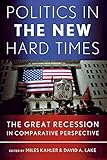Politics in the New Hard Times : The Great Recession in Comparative Perspective / ed. by Miles Kahler, David A. Lake.
Material type: TextSeries: Cornell Studies in Political EconomyPublisher: Ithaca, NY : Cornell University Press, [2013]Copyright date: ©2013Description: 1 online resource (328 p.) : 3 halftones, 10 tables, 20 charts, 1 line drawingContent type:
TextSeries: Cornell Studies in Political EconomyPublisher: Ithaca, NY : Cornell University Press, [2013]Copyright date: ©2013Description: 1 online resource (328 p.) : 3 halftones, 10 tables, 20 charts, 1 line drawingContent type: - 9780801478277
- 9780801467639
- 330.9/0511 23
- online - DeGruyter
- Issued also in print.
| Item type | Current library | Call number | URL | Status | Notes | Barcode | |
|---|---|---|---|---|---|---|---|
 eBook
eBook
|
Biblioteca "Angelicum" Pont. Univ. S.Tommaso d'Aquino Nuvola online | online - DeGruyter (Browse shelf(Opens below)) | Online access | Not for loan (Accesso limitato) | Accesso per gli utenti autorizzati / Access for authorized users | (dgr)9780801467639 |
Frontmatter -- Contents -- Illustrations -- Preface -- Introduction. ANATOMY OF CRISIS -- Part I. CRISES AND POLITICS -- 1. ECONOMIC CRISIS AND GLOBAL GOVERNANCE -- 2. POLITICS IN HARD TIMES REVISITED -- 3. PARTISAN FINANCIAL CYCLES -- 4. THE POLITICS OF HARD TIMES -- Part II. INTERESTS, CO ALI TIONS, AND CONSEQUENCES -- 5. THE PO LITI CAL ORIGINS OF OUR ECONOMIC DISCONTENTS -- 6. PUZZLES FROM THE FIRST GLOBALIZATION -- 7. PORTFOLIO POLITICS IN THE NEW HARD TIMES -- 8. COALITION OF LOSERS -- 9. CRAFTING TRADE STRATEGY IN THE GREAT RECESSION -- 10. WORLDS IN COLLISION -- Afterword. YET MORE HARD TIMES? -- References -- About the Contributors -- Index
restricted access online access with authorization star
http://purl.org/coar/access_right/c_16ec
The Great Recession and its aftershocks, including the Eurozone banking and debt crisis, add up to the worst global economic crisis since the Great Depression of the 1930s. Although economic explanations for the Great Recession have proliferated, the political causes and consequences of the crisis have received less systematic attention. Politics in the New Hard Times is the first book to focus on the Great Recession as a political crisis, one with both political sources and political consequences.The authors examine variation in crises over time and across countries, rather than treating these events as undifferentiated shocks. Chapters also explore how crisis has forced the redefinition and reinforcement of interests at the level of individual attitudes and in national political coalitions. Throughout, the authors stress that the Great Recession is only the latest in a long history of international economic crises with significant political effects-and that it is unlikely to be the last.Contributors: Suzanne Berger, MIT; J. Lawrence Broz, University of California, San Diego; Peter Cowhey, University of California, San Diego; Peter A. Gourevitch, University of California, San Diego; Stephan Haggard, University of California, San Diego; Peter A. Hall, Harvard University; Miles Kahler, University of California, San Diego; Peter J. Katzenstein, Cornell University; Ikuo Kume, Waseda University; David A. Lake, University of California, San Diego; Megumi Naoi, University of California, San Diego; Stephen C. Nelson, Northwestern University; Pablo Pinto, Columbia University; James Shinn, Princeton University
Issued also in print.
Mode of access: Internet via World Wide Web.
In English.
Description based on online resource; title from PDF title page (publisher's Web site, viewed 02. Mrz 2022)


